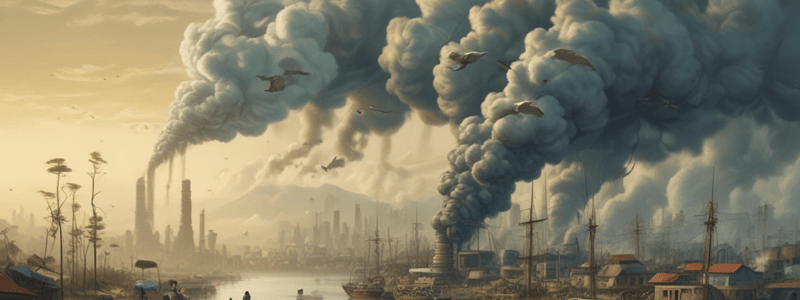Podcast
Questions and Answers
Under what circumstances is it allowed to kill or destroy wildlife?
Under what circumstances is it allowed to kill or destroy wildlife?
- When it is done for commercial purposes
- When it is done to protect the environment
- When it is done to preserve wildlife habitat
- When it is done as part of religious rituals or to prevent imminent danger to human life (correct)
What is considered an unlawful act towards wildlife resources and their habitats?
What is considered an unlawful act towards wildlife resources and their habitats?
- Working with established tribal groups or indigenous cultural communities
- Willfully and knowingly exploiting wildlife resources and their habitats (correct)
- Conducting authorized research or experiments
- Developing conservation programs for wildlife species
What is not a permitted act in critical habitats?
What is not a permitted act in critical habitats?
- Conducting scientific research
- Mineral exploitation and/or extraction (correct)
- Establishing wildlife corridors
- Building conservation centers
What is a permitted reason for killing or destroying wildlife?
What is a permitted reason for killing or destroying wildlife?
What is an example of an act that inflicts injury and cripples wildlife species?
What is an example of an act that inflicts injury and cripples wildlife species?
What is an unlawful act in regards to critical habitats?
What is an unlawful act in regards to critical habitats?
Under what circumstances is killing or destroying wildlife allowed?
Under what circumstances is killing or destroying wildlife allowed?
What is an act that is allowed in critical habitats?
What is an act that is allowed in critical habitats?
What is an example of an act that is detrimental to wildlife?
What is an example of an act that is detrimental to wildlife?
What is not a permitted act towards wildlife species?
What is not a permitted act towards wildlife species?
Study Notes
Environmental Laws in the Philippines
Clean Air Act (RA 8749) of 1999
- The State shall protect and advance the right of the people to a balanced and healthful ecology
- The State recognizes the principle that "polluters must pay"
- The State shall pursue a policy of balancing development and environmental protection
- The framework for sustainable development shall be pursued
- Key definitions:
- Air pollution: any alteration of the physical, chemical, and biological properties of the atmospheric air
- Air pollutant: any matter found in the atmosphere other than oxygen, nitrogen, water vapor, carbon dioxide, and inert gases
- Emissions: any air contaminant, pollutant, gas stream, or unwanted sound from a known source
- Greenhouse gases: gases that can potentially or reasonably be expected to induce global warming
- Mobile source/motor vehicle: any vehicle propelled by a gasoline or diesel engine or by any means other than human or animal power
- Stationary source: any building or immobile structure, facility, or installation that emits or may emit any air pollutant
Ecological Solid Waste Management Act (RA 9003) of 2000
- The State shall adopt a systematic, comprehensive, and ecological solid waste management program
- The program shall ensure the protection of public health and the environment
- Key definitions:
- Solid wastes: all discarded household, commercial, non-hazardous institutional, and industrial waste
- Ecological solid waste management: a systematic and comprehensive approach to managing solid waste, which includes segregation, collection, transportation, storage, treatment, and disposal
- Objectives:
- Ensure the protection of public health and the environment
- Utilize environmentally sound methods for solid waste management
- Promote national research and development programs for improved solid waste management and resource conservation techniques
Clean Water Act (RA 9275) of 2004
- The State shall pursue a policy of economic growth in a manner consistent with the protection, preservation, and revival of the quality of fresh, brackish, and marine waters
- Key definitions:
- Discharge: includes, but is not limited to, the act of spilling, leaking, pumping, pouring, emitting, emptying, releasing, or dumping of any material into a water body or onto land
- Effluent: discharges from a known source that is passed into a body of water or land
- Water pollution: any alteration of the physical, chemical, biological, or radiological properties of a water body resulting in the impairment of its purity or quality
- Objectives:
- Streamline processes and procedures in the prevention, control, and abatement of pollution of the country's water resources
- Promote environmental strategies, use of appropriate economic instruments, and control mechanisms for the protection of water resources
Toxic Substances and Hazardous and Nuclear Wastes Control Act (RA 6969) of 1990
- The State shall regulate, restrict, or prohibit the importation, manufacture, processing, sale, distribution, use, and disposal of chemical substances and mixtures that present unreasonable risk and/or injury to health or the environment
- Key definitions:
- Hazardous wastes: substances that are without any safe commercial, industrial, agricultural, or economic usage and are shipped, transported, or brought from the country of origin for dumping or disposal
- Objectives:
- Keep an inventory of chemicals being imported, manufactured, or used in the Philippines
- Monitor and regulate the importation, manufacture, processing, handling, storage, transportation, sale, distribution, use, and disposal of chemical substances and mixtures
- Inform and educate the populace regarding the hazards and risks attendant to the manufacture, handling, storage, transportation, processing, distribution, use, and disposal of toxic chemicals and other substances and mixtures
Wildlife Resources Conservation and Protection Act (RA 9147) of 2001
- The State shall conserve and protect wildlife resources and their habitats for sustainability
- Key definitions:
- Wildlife resources: all living organisms, including animals, plants, and microorganisms
- Habitat: the natural environment in which a species or population lives
- Objectives:
- Conserve and protect wildlife species and their habitats to promote ecological balance and enhance biological diversity
- Regulate the collection and trade of wildlife
- Pursue, with due regard to the national interest, the Philippine commitment to international conventions for the protection of wildlife and their habitats
Studying That Suits You
Use AI to generate personalized quizzes and flashcards to suit your learning preferences.
Description
A comprehensive quiz on the Philippine Clean Air Act of 1999, covering its provisions and principles for air pollution control and environmental protection.




